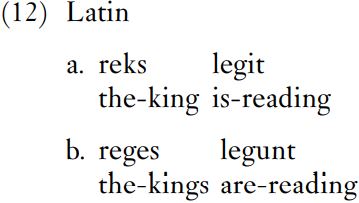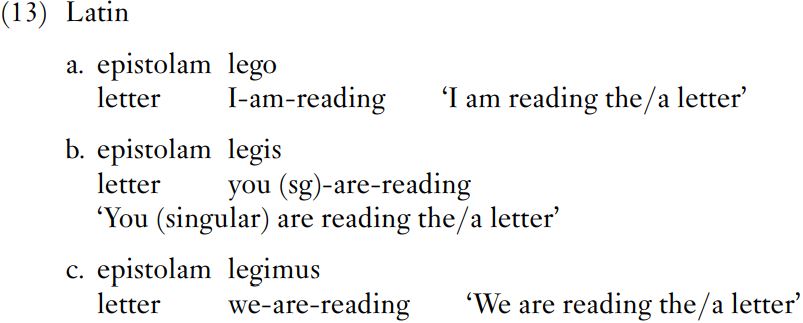

Grammar


Tenses


Present

Present Simple

Present Continuous

Present Perfect

Present Perfect Continuous


Past

Past Simple

Past Continuous

Past Perfect

Past Perfect Continuous


Future

Future Simple

Future Continuous

Future Perfect

Future Perfect Continuous


Parts Of Speech


Nouns

Countable and uncountable nouns

Verbal nouns

Singular and Plural nouns

Proper nouns

Nouns gender

Nouns definition

Concrete nouns

Abstract nouns

Common nouns

Collective nouns

Definition Of Nouns

Animate and Inanimate nouns

Nouns


Verbs

Stative and dynamic verbs

Finite and nonfinite verbs

To be verbs

Transitive and intransitive verbs

Auxiliary verbs

Modal verbs

Regular and irregular verbs

Action verbs

Verbs


Adverbs

Relative adverbs

Interrogative adverbs

Adverbs of time

Adverbs of place

Adverbs of reason

Adverbs of quantity

Adverbs of manner

Adverbs of frequency

Adverbs of affirmation

Adverbs


Adjectives

Quantitative adjective

Proper adjective

Possessive adjective

Numeral adjective

Interrogative adjective

Distributive adjective

Descriptive adjective

Demonstrative adjective


Pronouns

Subject pronoun

Relative pronoun

Reflexive pronoun

Reciprocal pronoun

Possessive pronoun

Personal pronoun

Interrogative pronoun

Indefinite pronoun

Emphatic pronoun

Distributive pronoun

Demonstrative pronoun

Pronouns


Pre Position


Preposition by function

Time preposition

Reason preposition

Possession preposition

Place preposition

Phrases preposition

Origin preposition

Measure preposition

Direction preposition

Contrast preposition

Agent preposition


Preposition by construction

Simple preposition

Phrase preposition

Double preposition

Compound preposition

prepositions


Conjunctions

Subordinating conjunction

Correlative conjunction

Coordinating conjunction

Conjunctive adverbs

conjunctions


Interjections

Express calling interjection

Phrases

Sentences


Grammar Rules

Passive and Active

Preference

Requests and offers

wishes

Be used to

Some and any

Could have done

Describing people

Giving advices

Possession

Comparative and superlative

Giving Reason

Making Suggestions

Apologizing

Forming questions

Since and for

Directions

Obligation

Adverbials

invitation

Articles

Imaginary condition

Zero conditional

First conditional

Second conditional

Third conditional

Reported speech

Demonstratives

Determiners


Linguistics

Phonetics

Phonology

Linguistics fields

Syntax

Morphology

Semantics

pragmatics

History

Writing

Grammar

Phonetics and Phonology

Semiotics


Reading Comprehension

Elementary

Intermediate

Advanced


Teaching Methods

Teaching Strategies

Assessment
Number and person linkage
المؤلف:
Jim Miller
المصدر:
An Introduction to English Syntax
الجزء والصفحة:
106-9
3-2-2022
1982
Number and person linkage
We turn now to the final strand of syntactic linkage in Latin, the relationship between subject nouns and verbs. Consider (12).

In (12a), reks is singular and the verb leg- (read) has the suffix -it, which is singular. In (12b), reges is plural and leg- has the suffix -unt, which is plural. The traditional formula is that the verb agrees with the subject noun in number (and person). This analysis accords with the view that the subject noun (phrase) is more important than the other nouns in a clause because speakers use subject nouns to name the entity they want to talk about. At various places in this introduction, however, we have seen that there are good reasons to consider the verb the head of a given clause, controlling all the other words and phrases in it. From the perspective of dependency relations and the lexicon, the relation between the verb and subject noun is no different from the relations between the verb and other nouns in clauses.
Whichever analysis readers favour, the term ‘agreement in number’ is not accurate. Either the subject noun imposes a given number on the verb or the verb imposes a given number of the noun. That is, both analyses recognize a controlling word, and where there is a controlling word we are dealing with government.
Verbs in Latin signal more than just number. Other suffixes are added to verb stems in Latin, as shown in (13).

The contrast between lego in (13a) and legis in (13b) has to do with who is presented as reading, the speaker or the addressee. The speaker is considered the central participant in a conversation, the first person. The addressee is the second in importance, that is, is the second person. The speaker and others can be presented as jointly doing something, as in (13c). Lego is described as being in the first person singular, legimus as being in the first person plural and legis as being in the second person singular. In (12a, b), the speaker presents the action as being performed by neither the speaker nor the hearer but by a third person in (12a) and by third persons in (12b). Legit is said to be in the third person singular, and legunt is described as being in the third person plural. Latin has pronouns, but they were not used unless for emphasis.
 الاكثر قراءة في Syntax
الاكثر قراءة في Syntax
 اخر الاخبار
اخر الاخبار
اخبار العتبة العباسية المقدسة

الآخبار الصحية















 قسم الشؤون الفكرية يصدر كتاباً يوثق تاريخ السدانة في العتبة العباسية المقدسة
قسم الشؤون الفكرية يصدر كتاباً يوثق تاريخ السدانة في العتبة العباسية المقدسة "المهمة".. إصدار قصصي يوثّق القصص الفائزة في مسابقة فتوى الدفاع المقدسة للقصة القصيرة
"المهمة".. إصدار قصصي يوثّق القصص الفائزة في مسابقة فتوى الدفاع المقدسة للقصة القصيرة (نوافذ).. إصدار أدبي يوثق القصص الفائزة في مسابقة الإمام العسكري (عليه السلام)
(نوافذ).. إصدار أدبي يوثق القصص الفائزة في مسابقة الإمام العسكري (عليه السلام)


















